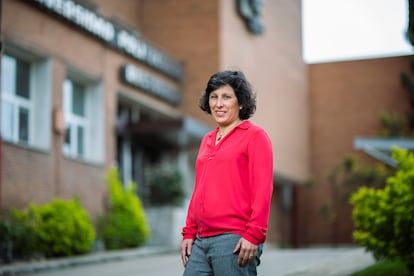A bouquet of flowers and the applause of her collaborators received Asunción Gómez-Pérez (Azuaga, Badajoz, 54 years old) the morning after being elected to chair q of the Royal Spanish Academy (RAE) in the plenary session on Thursday 7 april.
This professor of Artificial Intelligence, vice-rector for Research, Innovation and Doctorate at the Polytechnic University of Madrid, won the vote over the other candidate, Senén Barro, also a student of the same subject.
It seems that with her appointment the RAE puts a full stop: Gómez-Pérez is the youngest person of all the academics (40 in number plus the four elected) and the first from the area of Information Technology and the communication.
With it, the tendency to include more academics in the institution is also confirmed: of the last four elected, three are women.
Professor Gómez-Pérez welcomes the journalist with a small army of cards spread out on her table, which she glances at to help him with his answers, a sign of her teaching profession and of a mind used to solving problems from mathematical logic.
In the conversation she resorts to explaining her reasoning with sketches when she sees that her interlocutor is left behind.
More information
The RAE chooses Asunción Gómez-Pérez, an expert in artificial intelligence, as an academic
Ask.
What do you feel when you arrive at the RAE, where philologists and writers dominate?
Response.
There are also other professions.
When in February [the academic], Pedro García Barreno asked me to propose my candidacy, I was pleasantly surprised.
He explained to me that the RAE wanted to strengthen the subject of artificial intelligence in the language and not lag behind in the application of new technologies.
Since I work with dictionaries, thesauri and language technologies in research projects, my profile could be ideal.
Q.
Why did you want to be a computer scientist?
R.
My father is a doctor, my mother, chemistry, and I was going to study Pharmacy, but I liked mathematics more.
I opted for Computer Science, some studies that were beginning in 1985. I came to the Polytechnic, then I did my doctorate and spent a year at Stanford University (California).
On my return I created a group in Ontological Engineering, which carries out basic research and innovates in collaborative projects with companies and administrations.
Q.
What is ontological engineering?
R.
Ontologies are computational models that make a system intelligent, and for this they use words.
Normally, ontologies are built in English because the scientific community works in that language.
But around 2006 we realized that this was a barrier to transferring technology to companies in Spain.
Therefore, we began to investigate methods to translate those terms, and we built programs and algorithms that would do that translation.
For this we had to use dictionaries, thesauri, corpus... Look, in any dictionary you have a word, with its definition, and we understand it because we know how to read the language, we know the grammar... but when you want the computer to understand a text, you need a computational language.
They are like glasses that we put on to understand a text.
P.
As an expert in artificial intelligence, which according to the RAE is the science that creates computer programs that execute operations comparable to those carried out by the human mind, such as learning or reasoning, what has been your research work?
R.
I have coordinated numerous international and national projects.
In many we have carried out analysis of natural language processing, which allows the artificial intelligence system to understand a written text and extract data, to later reason with them.
Asunción Gómez-Pérez, outside the Auditorium of the UPM.INMA FLORES (EL PAIS)
Q.
How are you going to transfer all this knowledge to the RAE?
R.
Artificial intelligence is present in our daily lives in numerous applications and devices.
What is needed is that when the machines communicate with the users they use correct Spanish.
That is one of the objectives of the Spanish Language and Artificial Intelligence (LEIA) project, of the RAE [presented in Seville in 2019].
In Spain, the Strategic Project for the Recovery and Economic Transformation (Perte) of the New Language Economy [with 1,100 million] was announced [on March 1], in which there are already actions, such as the agreement that the RAE and the Ministry of Economic Affairs and Digital Transformation.
This project will raise awareness of the need for good use of Spanish in new media and applications.
Many times,
we use a very reduced vocabulary in social networks and this supposes a loss of the richness of our language.
In addition, it must be adapted to the variants of Spain and Latin America.
Q.
What are those machines?
A.
Any device that has
software
: a computer, a robot, a mobile, a car, a tractor
,
a refrigerator... anything that is connected to the internet and can receive and send written or spoken messages.
Q.
These machines usually come with an incomprehensible instruction manual, which are bad translations from English.
R.
One of the objectives of the symbiosis of artificial intelligence and language is to improve those translations for correct Spanish.
There you have to do an important job with neologisms.
P.
By the way, on your Twitter account your biography was in English.
In the option to translate that this social network gave, the "director" of English remained in Spanish, as if you were a man.
It is said that in the Chinese model, artificial intelligence is to control society
R.
That happens because it is a literal translation.
If it had been enriched with a list of names of men and women, the system would have more intelligence.
The translation must take into account the context in which that word is.
Q.
Most science is also written in English.
A.
The problem is that researchers are evaluated and promoted for publishing in prestigious journals that are in English.
As long as the evaluation system for research personnel in Spain does not change, it is foreseeable that we scientists will continue to publish in that language.
Q.
What is to come with those machines that listen to us and talk to us?
R.
If you are looking for an idea more focused on science fiction, I dare to comment on neurotechnology: think of a sentence and that my thought generates a text through the signals that my brain emits, that we write with the mind.
That would be for me the most exciting future to investigate.
Q.
Could it happen like in the movie
2001: A Space Odyssey
, that a supercomputer rebels and goes against the humans?
R.
Citizens must be given messages of calm and confidence with artificial intelligence applications, since they must be safe and respectful of privacy.
The European Commission is developing rules for the ethical and safe use of artificial intelligence in companies, industries and Administrations, always placing the citizen at the center.
Compared to the US model, which is driven by economics, or China, which seeks to control society.
Citizens must be given messages of calm and confidence with artificial intelligence applications
P.
Will the machines also speak an inclusive language?
R.
I have not worked much in this field, but it is important to make the texts understandable without being cumbersome.
Q.
You are the fourteenth woman to join the RAE in its 309-year history.
R.
In the Polytechnic there are more professors and researchers than professors and researchers;
I am used to working in environments where there are fewer women than men.
It is important that institutions do not give up half of the talent;
the more balanced that representation is, based on merit and ability, the better.
Q.
In your free time, what do you read?
R.
I really like reading technology.
I take advantage of the vacations to read what is technical that has not given me time due to the management of the Vice-Rectorate.
Now I study everything that has to do with the ethics of artificial intelligence and the social implications of technology.
Q.
Have you thought about what your entrance speech will be about?
R.
It will be related to language and artificial intelligence.
I am also interested in talking about the use of the letter q in engineering.
Exclusive content for subscribers
read without limits
subscribe
I'm already a subscriber


/cloudfront-eu-central-1.images.arcpublishing.com/prisa/UNETYPZTLZGJZGXEZA2R4WGRVY.jpg)
/cloudfront-eu-central-1.images.arcpublishing.com/prisa/TY47FSPP2RB4BEVHHZRVRO4QLY.jpg)

/cloudfront-eu-central-1.images.arcpublishing.com/prisa/MDIOKAISMOMPFW6N7JYHFUNE4M.jpg)

/cloudfront-eu-central-1.images.arcpublishing.com/prisa/ZHE3KZGX3VHINBISBUJJB436HY.jpg)
/cloudfront-eu-central-1.images.arcpublishing.com/prisa/LBM66KQSSNED3ENKVDPGTMUMLQ.JPG)
/cloudfront-eu-central-1.images.arcpublishing.com/prisa/ZMRP4MAVAJFR5F74GQ7A2H2MA4.jpg)